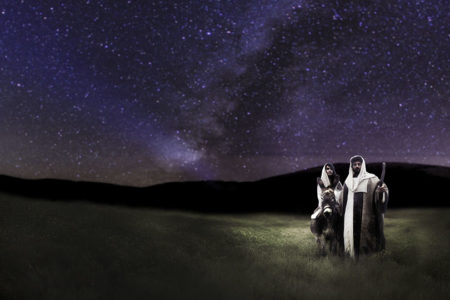A Birthday Party for the Ages
When I was growing up, Christmas was like a Norman Rockwell painting.
We always had a real pine tree that I had to wiggle under to water each day. My parents would help us kids decorate sugar cookies, which were the second best treat we ate after my mom’s famous chocolate-covered “stained-glass window” marshmallow treats.
And we always decorated the tree exactly the same way every year: white lights adorned with “snow” we whipped up from laundry detergent. It looked like a fresh snowfall had dusted our living room.
But one part of our family’s celebration was even more special. In grade school, my sisters and I attended a weekly backyard Bible club. Each Wednesday the school bus would drop 20 or 30 of us off at an elderly couple’s home in our neighborhood, and we would do Bible lessons and play games until our parents came. But at Christmas, we put on a live nativity.
We had real stables, real animals, music we recorded ourselves, and costumes. My specialty was a convincing portrayal of a terrified shepherd who shook all over when the angel appeared to him in the field to announce Christ’s birth (an impressive feat while wearing a snowsuit under a shepherd’s outfit).
Each Christmas Eve at dusk, my family would join the crowd in the snowy cold while we acted out the story of Jesus’ birth. After that, the real celebration began!
Our family would go home and enjoy a freshly baked birthday cake. Every year. Without fail. My mom would ceremoniously carry out the candle-studded cake, and we’d all sing happy birthday to Jesus. Then we would blow out the candles together and have a birthday party for the Savior. After all, it was His birthday eve, right? Well, not exactly.
Why Do We Celebrate?
It wasn’t until years later that I learned December 25 wasn’t when Jesus was born in Bethlehem of Judea. Eventually, this fact forced me to ask myself, If it’s not Jesus’ birthday, why do we celebrate Christmas?
To be sure, some Christians don’t celebrate Christmas, and others celebrate it on a different day. But no matter what our traditions are, at some point it makes sense to ask ourselves why we celebrate His birthday at all. Is remembering it really so important?
After all, the apostle Paul said the essentials of the gospel—the things of “first importance”—are Jesus’ death, burial, and resurrection. Those events are far easier to place on a calendar, and they relate directly to our salvation and eternity with God.
The theological answer to my quandary, though actually simple, was profound enough to overturn all of our family traditions.
When we celebrate Christ’s birth, we celebrate two truths about Jesus: His incarnation and habitation.
Incarnation. “The Word [Jesus] became flesh and dwelt among us” (Jn. 1:14). We rejoice because God condescended to come to Earth in the form of flesh and blood.
The idea itself is jarring. For ages, opponents of Christianity have scoffed and ridiculed the notion that the sovereign Ruler of the universe would become human. But that is the beauty of the incarnation. Though it was beneath His dignity, He became human anyway. The apostle John told us he touched Jesus with his hands, heard Him with his ears, and saw Him with his eyes. God literally became flesh.
Philippians 2 tells us Jesus didn’t consider His divine rights and glory as things to be grasped or held onto for dear life. Instead, He humbled Himself and became a servant in a human body to serve God and mankind.
The one who imagined the concept of existence, created life with a word, and moved outside His creation like a painter over a canvas, chose to become a helpless baby who couldn’t feed Himself. The idea is startling but also worthy of celebration and exaltation. Certainly, worthy of a party.
Habitation. When the Word became flesh, He “dwelt among us” (Jn. 1:14). The word dwelt literally means to “pitch a tent.” In the ancient world it expressed where someone chose to live.
When God had Moses and the Israelites build the Tabernacle, God chose to dwell in the tent in the middle of the Israelite camp. He literally chose to live among His people. These are the images the apostle John referenced when he said Jesus became flesh and “pitched His tent” among us. Jesus did not do so because we make such great neighbors. He did so to enable God to dwell with us eternally.
Jesus came, lived, died, and rose again to “bring us to God” (1 Pet. 3:18).
I like to think of the incarnation as the tip of a spear in a major offensive that God enjoined on His cosmic rescue mission to free us from our cellblocks behind enemy lines and bring us home to Him. The incarnation is the moment all of history had been pointing to, where God dwelt among us and “delivered us from the power of darkness and conveyed us into the kingdom of the Son of His love” (Col. 1:13).
Jesus changed His address, His habitation, so that we could change ours.
What Type of Party?
So, what type of party do we throw to celebrate such great truths? It doesn’t have to be a birthday party. But it certainly seems like some celebration is in order. Presents make sense. Singing special songs, eating festive foods, and gathering with loved ones are all traditions to celebrate these facts about Jesus.
The difficulty for most of us, though, is not that we forget why we celebrate Christmas. It’s that we allow the party feature to nudge out the purpose. Our favorite traditions become what we look forward to as we prepare for the holiday. And the deep, doctrinal beauty of the incarnation becomes secondary, something we think about for a few minutes during our Christmas Eve services at church—or perhaps between the live nativity and opening of presents.
The point of the party is to celebrate truth—in as many ways as you and your family would like. The Savior came in a manner no one ever could have expected: God in flesh, coming to live among us eternally. This truth belongs in every present and every carol. It belongs in every garland, baked treat, and nativity creche.
Traditions and “Norman Rockwell moments” with family are wonderful, but they are not what we celebrate. What makes Christmas a party for the ages is the truth that in all of history—past, present, and future—the fact that God stepped into human flesh to rescue His beloved creation is the best news humanity has ever received. How can we not celebrate?
God Himself has come to save us! Let’s throw a party! I think my family may have cake at ours.








